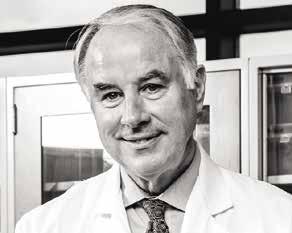
4 minute read
Message from the Executive Director
Message from the Center’s Executive Director
I like to say that Pennington Biomedical is in the business of bringing solutions from
Advertisement
cells to society. Consider our work to find solutions for Alzheimer’s Disease. Our basic researchers analyzed the ends of human chromosomes, called telomeres, and realized that individuals with shorter telomeres are at an increased risk for Alzheimer’s Disease. Our researchers couple this new information with the known fact that individuals with low levels of physical activity also have shorter telomeres. Our population scientists can take this foundational science and begin testing interventions in people who live right here in Baton Rouge to determine the “magic number” of minutes of exercise that might make a difference in staving off Alzheimer’s Disease. That is just one example of how we take solutions from cells to society.
Our most public example of taking solutions from cells to society is our Obecity, USA campaign. This groundbreaking campaign brings to light what everyone working at Pennington Biomedical has known for some time: obesity is a chronic disease and the result of a number of factors, many of which individuals have no control over. Our work to end the stigma associated with obesity will promote meaningful conversations in doctors’ offices, in public policy settings, and even around the dinner table, which will help us end this pandemic.
This campaign was funded entirely by philanthropy, the key ingredient to our history of success in advancing scientific discovery and solutions. I am forever both grateful and humbled by those who choose to partner with us.
We continue to play a critical role in the fight against COVID. Early on, we participated in a study with school-aged children to develop and test a non-invasive biomarker to indicate the presence of the virus. Today, we are participating in a clinical trial to study the safety of the Moderna vaccine in children. This represents our first ever vaccine trial.
Anecdotally, we heard that the number of children being diagnosed with Type 2 diabetes was increasing during the pandemic. We undertook a retrospective study, and we did indeed learn that locally the number of children presenting with Type 2 diabetes doubled. Worse, these children were very sick when they came to the hospital. Our concern is that stay-at-home orders, and the lack of physical activity along with less healthy eating habits and the combination of stress and worse sleep is responsible for this trend, but more research is needed to better understand why the incidence increased so dramatically.
This year, we introduced the first Pennington Biomedical Publication-of-the-Year-Award to highlight and reward the significant, innovative, and impactful research publications authored by our scientists.
The investigators authoring the winning manuscript received a $10,000 award. This year’s winner was the Promoting Successful Weight Loss in Primary Care in Louisiana (PROPEL) trial outcomes reported in the New England Journal of Medicine. The PROPEL model has the potential to improve access to weight loss programs for large, underserved populations across the country. PROPEL challenges the belief that weight loss through lifestyle interventions is not achievable, especially in hard-to-reach populations. This particular finding is of utmost importance because of what it demonstrates, but of special significance to us, every single author was a Pennington Biomedical or Louisiana researcher.
John Kirwan, PhD, Executive Director
Pennington Biomedical Research Center
All the nominees demonstrated the potential to create a paradigm shift, challenge dogma, or represented a technical innovation. For example, our work with glucocorticoids filled an important knowledge gap and was published in Biomedicine. Glucocorticoids save lives, but they also promote obesity, reduce lean mass, enhance metabolic disease risk, and vastly increase the risk of frailty and diabetes onset. It is imperative we better understand the role of prolonged glucocorticoid therapy in unhealthy aging.
Still more work was published in Endocrinology. We demonstrated the important role of protein restriction in reducing body weight and improving metabolism. This research will pave the way for future drug development.
We are also very excited to be part of the “Nutrition for Precision Health (NPH), powered by the All of Us” consortium. We know that nutrition is at the epicenter of human health and disease. However, a “one size fits all” approach to clinical nutrition is failing a large segment of the population. Individual factors including genetics, metabolism, physiology, microbiome, behavior, the built in and contextual environment all underlie the inherent variability in response to diets. Exciting new research shows that machine learning algorithms can integrate this complex information and predict how someone responds to a given diet. As part of a five-year grant and together with LSU Health New Orleans and the NIDDK- Phoenix Clinical Center, we will generate a rich database from a diverse population to develop a first-of-its-kind diet prediction algorithm. The data and biospecimens collected will be used to inform paradigm shifting approaches that enable large-scale delivery of personalized dietary prescriptions to promote general health, delay cardiometabolic diseases, and importantly, address health disparities.
Every day, Pennington Biomedical advances scientific discovery that helps millions of people to live longer and better lives. I am constantly inspired by my colleagues and those in the global community who choose to partner with us.
Sincerely,
Dr. John P. Kirwan, PhD Executive Director George A. Bray, Jr. Endowed Super Chair in Nutrition








